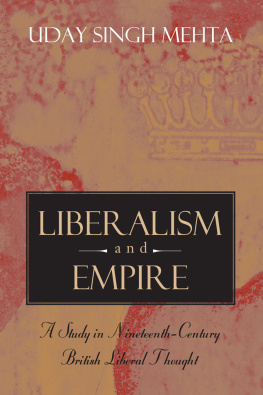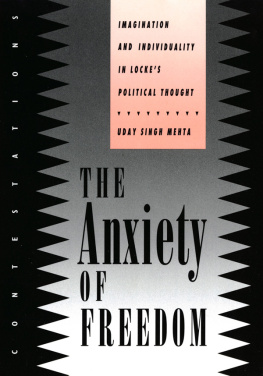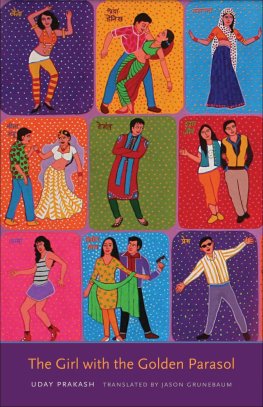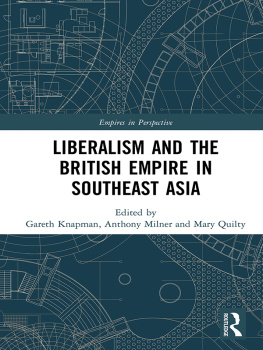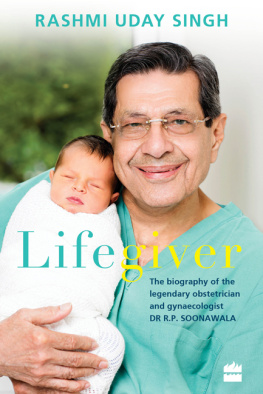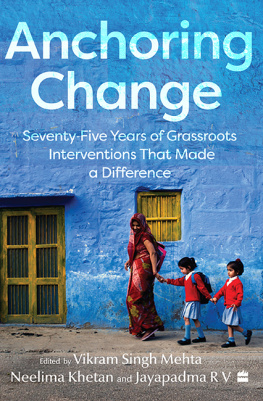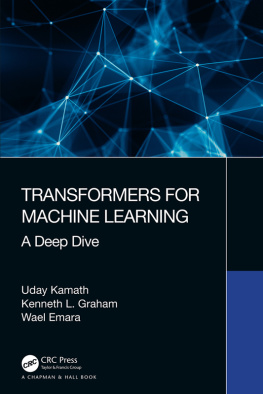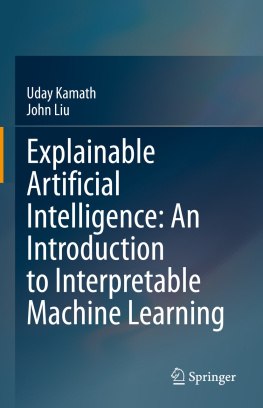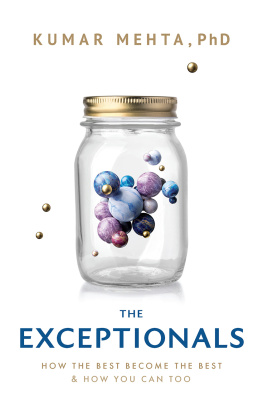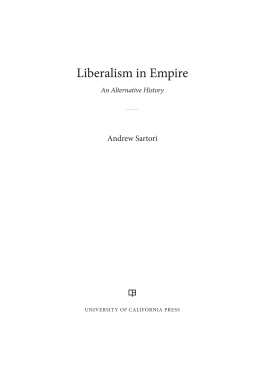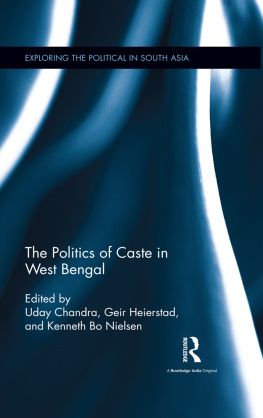Uday Singh Mehta - Liberalism and Empire
Here you can read online Uday Singh Mehta - Liberalism and Empire full text of the book (entire story) in english for free. Download pdf and epub, get meaning, cover and reviews about this ebook. year: 2018, publisher: University of Chicago Press, genre: Politics. Description of the work, (preface) as well as reviews are available. Best literature library LitArk.com created for fans of good reading and offers a wide selection of genres:
Romance novel
Science fiction
Adventure
Detective
Science
History
Home and family
Prose
Art
Politics
Computer
Non-fiction
Religion
Business
Children
Humor
Choose a favorite category and find really read worthwhile books. Enjoy immersion in the world of imagination, feel the emotions of the characters or learn something new for yourself, make an fascinating discovery.
- Book:Liberalism and Empire
- Author:
- Publisher:University of Chicago Press
- Genre:
- Year:2018
- Rating:3 / 5
- Favourites:Add to favourites
- Your mark:
- 60
- 1
- 2
- 3
- 4
- 5
Liberalism and Empire: summary, description and annotation
We offer to read an annotation, description, summary or preface (depends on what the author of the book "Liberalism and Empire" wrote himself). If you haven't found the necessary information about the book — write in the comments, we will try to find it.
Liberalism and Empire — read online for free the complete book (whole text) full work
Below is the text of the book, divided by pages. System saving the place of the last page read, allows you to conveniently read the book "Liberalism and Empire" online for free, without having to search again every time where you left off. Put a bookmark, and you can go to the page where you finished reading at any time.
Font size:
Interval:
Bookmark:
The University of Chicago Press, Chicago 60637
The University of Chicago Press, Ltd., London
1999 by The University of Chicago
Printed in the United States of America
All rights reserved. Published 1999
08 07 2 3 4 5
ISBN: 0-226-51882-5 (paper)
ISBN: 978-0-226-51918-0 (ebook)
Library of Congress Cataloging-in-Publication Data
Mehta, Uday Singh.
Liberalism and empire : a study in nineteenth-century British liberal thought / Uday Singh Mehta.
p. cm.
Includes bibliographical references and index.
ISBN 0-226-51881-7 (alk. paper).ISBN 0-226-51882-5 (pbk. : alk. paper)
1. LiberalismGreat BritainHistory19th century. 2. Great BritainColoniesHistory19th century. I. Title.
JC574.2.G7M44 1999
320.5'13'0941dc21
98-40812
CIP
An earlier version of appeared as Strategies of Exclusion, Politics & Society 18, no. 4 (1989): 42754. Reprinted by permission of Sage Publications.
 The paper used in this publication meets the minimum requirements of the American National Standard for Information SciencesPermanence of Paper for Printed Library Materials, ANSI Z39.48-1992.
The paper used in this publication meets the minimum requirements of the American National Standard for Information SciencesPermanence of Paper for Printed Library Materials, ANSI Z39.48-1992.
LIBERALISM AND EMPIRE
A Study Nineteenth-Century British Liberal Thought
UDAY SINGH MEHTA
THE UNIVERSITY OF CHICAGO PRESS
CHICAGO AND LONDON
In memory of my late grandfather Mohan Sinha Mehta and for my father.
Both consummate citizens, and for me so much, much more.
CONTENTS
ACKNOWLEDGMENTS
The writing of this book has been a schooling in the various ways in which the autonomy of ones mind and the singularity of ones effort are, at best, supporting fictions to the process of thinking and writing. It is impossible to retrace the process by which extravagant and undisciplined hunches get chiseled to assume the shape of ideas backed by the requisite evidence. What is clear, however, is that through the course of that meandering journey, which so often returns to the initial hunches at stranger and stranger angles, one is moved along and held together by currents of support in which ones own role is quite limited. My debts at the completion of this book are so numerous, multifaceted, and deep that it is only by relying on a long-standing convention that I can claim it as fully mine. Three institutions and numerous individuals have made this book possible.
The initial encouragement to think about the philosophic link between liberalism and the British empire came in the form of a fellowship from the Society for the Humanities at Cornell University. The staff, the other associates, and especially its then director, Jonathan Culler, made the Society a place of luxurious intellectual seriousness. The fact that this book had its origins within the fold of the Societys interdisciplinary vitality has, I am sure, contributed enormously to it. It is a pleasure to thank the Society and Jonathan Culler for that wonderful year.
While at MIT I was the beneficiary of several grants from the office of the Dean of Social Sciences and the Provost that allowed me to take time off from teaching, hire research help, and travel to libraries in Britain and India. MIT is a remarkably self-confident institution. One of the many ways in which that is expressed is in the priority it gives to supporting research. I am deeply indebted to it for that emphasis.
Various friends and colleagues in Cambridge read substantial portions of this book. I am grateful for the help and critical promptings of Hayward Alker, Suzanne Berger, Archon Fung, Maria Clelia Guinazu, Ellen Immergut, Annabelle Lever, Steven Macedo, Pratap Mehta, Martha Minow, Barry Posen, and Myron Weiner. I thank Fareed Zakaria for an extended loan of his copy of the collected works of Edmund Burke. Eva Nagy and Maria Clelia Guinazu tried to compensate for my disorganized and delinquent ways by their generous and meticulous efficiency. I thank them for their unstinting help and concern.
There is, I am sure, a large group of academics who have come to rely on Joshua Cohens fierce intelligence and intellectual generosity as a way to encourage and guide them in their work. I belong to that group. His meticulous care as a reader, his ability to discern a coherence of purpose despite the cracks and crevices in a draft, and his openness to styles of thought and writing other than his own, make him an exemplary interlocutor. He has read this manuscript in many forms and at every juncture given me supportive and valued advice. And this despite what I think is a disagreement, or at least disquiet, with significant parts of the argument I offer.
Much of this book was written and rewritten while I was teaching at the University of Chicago. Anyone familiar with its intellectual culture in the humanities and social sciences would testify to its remarkable vibrancy. This book has benefited enormously from that culture and numerous individuals who contribute to it. Lloyd and Suzanne Rudolph read the manuscript and were generous in their comments, consistently insightful in their suggestions, and extremely kind in their warmth and concern. I thank them with gratitude and enormous admiration for their spirited curiosity and intellectual conviviality. Deborah Boucoyannis, Jim Chandler, Michael Dawson, Faisal Devji, Mahnaz Fancy, Joseph Cropsey, Carol Horton, Leslie Keros, Bernard Manin, William Sewell, Frank Sposito, Nathan Tarcov, John Tryneski, and Lisa Wedeen all read and commented on portions of the manuscript. I thank each of them for their effort and suggestions. David Laitin read most of the manuscript and commented on it with engaged acuity. While at Chicago I received from Akeel Bilgrami and Timothy Mitchell detailed and extremely helpful comments on the entire manuscript. I am very thankful for their effort and suggestions. Rebecca Bryant read the manuscript with a care that included attending to the peculiar vagaries of my punctuation and grammatical skills. I and in turn the reader are deeply in her debt. Fiona Maharg-Bravo and Mithi Mukerjee helped with library research and in doing so saved me considerable time and effort.
While living in Chicago I often attended the Lawndale Community Church in a neighborhood blighted by poverty, unemployment, drugs, and crime, though not by the destitution of hope. On numerous Sundays various members of the congregation, mindful of my struggle with this book, publicly and privately prayed for me. Their heartfelt concern and the sincerity of their conviction in the power of prayer touched me deeply. Moreover, it created a common ground for mutual respect and possible understanding despite the contrasting conditions of our daily lives. I have often thought that what I saw and learned at Lawndale Community Church vindicates the central message of this book: the salutary possibility of relating to what is different not by denying ones deepest convictions but by encasing them in a prior commitment to a humility that trumps the certainties of reason or revelation and in doing so denies space to power.
In this context I thank Dawn Neukirchner, who introduced me to Lawndale Community Church. As a member of several communities, a neighbor, and a teacher she exemplifies that striving of which 1 Corinthians 13:13 speaks, And now these three remain: faith, hope and love. But the greatest of these is love. As a deeply cherished friend Dawn gave me the benefit of care and advice while constantly challenging me to integrate into my work a kind of honesty which can so easily be lost sight of amid the thicket of academic considerations. I know that this book is better on account of that challenge, even if only because its inadequacies and its achievements are more deeply mine.
The writing of a book, like any challenging endeavor, draws on the broader conditions of ones well-being. Missy Allen, Abhijit Banerjee, Arundhati Banerjee, Jackie Bhabha, Paul Horwich, Peter Katzenstein, Suzanne Katzenstein, Tai Katzenstein, Ira Katznelson, Mona Khalidi, Rashid Khalidi, Sarah McConaghie, Anne Norton, Shankar Ramaswami, E. Somnathan, Rohini Somnathan, Mallory Stark, Tej Thapa, Dale Torrengo, Carole Travis, Jeffery Tulis, and Stephen Van Evera have in their own ways supplied the tactile conditions of care, encouragement, warmth, and sheer decency without which it is hard to imagine this book in its present form.
Next pageFont size:
Interval:
Bookmark:
Similar books «Liberalism and Empire»
Look at similar books to Liberalism and Empire. We have selected literature similar in name and meaning in the hope of providing readers with more options to find new, interesting, not yet read works.
Discussion, reviews of the book Liberalism and Empire and just readers' own opinions. Leave your comments, write what you think about the work, its meaning or the main characters. Specify what exactly you liked and what you didn't like, and why you think so.

